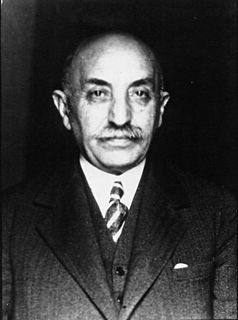
Georgios Papandreou was a Greek politician, the founder of the Papandreou political dynasty. He served three terms as prime minister of Greece. He was also deputy prime minister from 1950–1952, in the governments of Nikolaos Plastiras and Sofoklis Venizelos and served numerous times as a cabinet minister, starting in 1923, in a political career that spanned more than five decades.
This article gives an overview of liberalism in Greece. It is limited to liberal parties. The sign ⇒ denotes another party in that scheme. For inclusion in this scheme it isn't necessary so that parties labeled themselves as a liberal party.
Venizelism was one of the major political movements in Greece from the 1900s until the mid-1970s.

Konstantinos Tsaldaris was a Greek politician and twice Prime Minister of Greece.

Parliamentary elections were held in Greece on 31 March 1946. The result was a victory for the United Alignment of Nationalists, an alliance that included the People's Party, the National Liberal Party, the Reform Party, which won 206 of the 354 seats in Parliament. As a result Konstantinos Tsaldaris became Prime Minister leading a right-wing coalition. Nonetheless, he soon decided to resign in favor of Themistoklis Sophoulis, who led a government of national unity during the entire second phase of the civil war (1946–1949). One of the priorities of the new government was the proclamation of a plebiscite for the restoration of the Greek monarchy.

Parliamentary elections were held in Greece on 19 February 1956. The result was a victory for Constantine Karamanlis and his National Radical Union party by securing the electoral vote despite trailing in the popular vote. It was the first general election in Greece in which women had the right to vote, although women had first voted in a by-election in Thessaloniki Prefecture in 1953 in which the first female MP was elected.

Panagis Tsaldaris was a Greek politician and the 48th Prime Minister of Greece. He was a revered conservative politician and leader for many years (1922–1936) of the conservative People's Party in the period before World War II. He was the husband of Lina Tsaldari, a Greek suffragist, member of Parliament, and the Minister for Social Welfare.

Themistoklis Sofoulis or Sophoulis was a prominent centrist Greek politician from Samos Island, who served three times as Prime Minister of Greece, belonging to the centre-left wing of the Liberal Party, which he led for many years.

Stylianos Gonatas was a Greek military officer and Venizelist politician and Prime Minister of Greece between 1922 and 1924.

The attempted coup d'état of March 1935 was a Venizelist revolt against the People's Party government of Panagis Tsaldaris, which was suspected of pro-royalist tendencies.
Dimitrios Gontikas or Gondikas was a Greek politician and Speaker of the Hellenic Parliament.
In politics, centrism—the centre or the center —is a political outlook or specific position that involves acceptance or support of a balance of a degree of social equality and a degree of social hierarchy, while opposing political changes which would result in a significant shift of society strongly to either the left or the right.
Stavros Kostopoulos was a Greek banker and politician.
The Lebanon conference was held on May 17–20, 1944, between representatives of the Greek government in exile, the pre-war Greek political parties, and the major Greek Resistance organizations, with the British ambassador Reginald Leeper in attendance. The conference occurred after an anti-monarchist mutiny among the Greek military the previous month. Prime Minister Georgios Papandreou was unable to reconcile communist and anti-communist political factions.

















